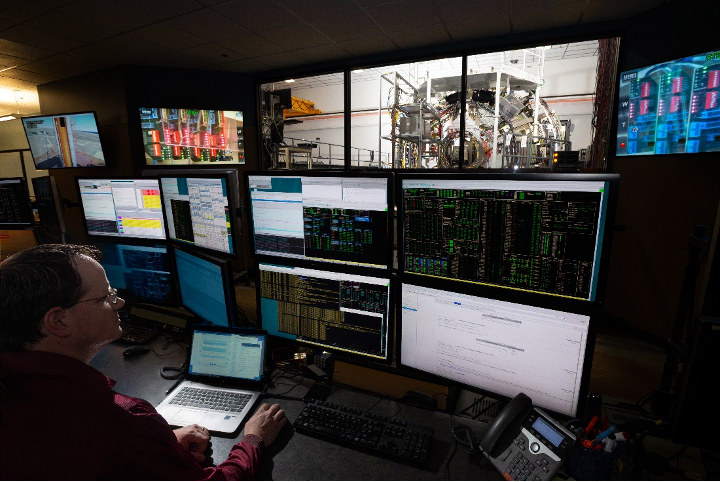
Lockheed Martin’s Orion Integrated Test Lab near Denver, Colorado. (Credit: Lockheed Martin)
Today, we celebrate the one-year anniversary of the launch of NASA’s successful Artemis I mission. Launched to the Moon on November 16, 2022, Artemis I was the first in a series of missions that will ultimately see the space agency return humans to the Moon.
Preparations for Artemis I required an extensive amount of testing and analysis of the Orion spacecraft's flight software. Orion developer and prime contractor Lockheed Martin needed to simulate the performance of the spacecraft under different conditions and scenarios to ensure optimal performance of the flight systems and return Artemis I safely to Earth.
To do so, Lockheed Martin selected Red Hat OpenStack Platform and Red Hat Enterprise Linux to create a secure private cloud environment for hosting simulation builds, testing, and analysis of the Orion spacecraft’s flight software.
Red Hat OpenStack Platform: deploying simulation build and test environments, efficiently
Lockheed Martin’s software developers used Red Hat OpenStack Platform to host simulation build and test environments for end-to-end runs and perform functional testing of the flight system. Developers ran multiple versions of the flight software in parallel, which helped optimize hardware use and lower demands on operations teams.
The software developers also relied heavily on Red Hat OpenStack Platform’s automated capabilities. The Lockheed Martin team created a standardized service catalog of evolving virtual machine images that could be deployed quickly, repeatedly and consistently. Retirement defaults and shutdown procedures were also automated to maximize efficient resource utilization. This helped save the team significant time that would otherwise have been spent attending to these procedures, freeing them up to focus on accelerating the pace of innovation.
Red Hat Enterprise Linux: support for a successful simulation, from launch to landing
Red Hat Enterprise Linux is the standard operating system for mission simulations. The world’s leading enterprise Linux platform gave Lockheed Martin the stability, security, high performance, and dependability needed to perform a successful simulation from launch to landing. With the support of Red Hat OpenStack Platform and Red Hat Enterprise Linux, the Lockheed Martin team successfully built, tested and proved a 28-day simulation across different scenarios. The simulation was completed well ahead of the launch of Artemis I, helping to propel NASA’s safe and triumphant return to the Moon.
Looking ahead to Artemis II
NASA’s next mission, Artemis II, is scheduled to launch in late 2024. This Artemis mission will have crew members aboard, making it the first NASA crewed mission to the Moon since Apollo 17. With human lives at stake, it will be even more critical to analyze, test, and prepare for a successful and safe flight. Lockheed Martin, NASA, and Red Hat will be working together to make sure that the launch and return of Artemis II goes just as smoothly as its predecessor.

NASA’s Orion spacecraft for the Artemis I mission splashed down in the Pacific Ocean after a 25.5 day mission to the Moon (Credit: NASA)
About the author
Red Hat is the world’s leading provider of enterprise open source software solutions, using a community-powered approach to deliver reliable and high-performing Linux, hybrid cloud, container, and Kubernetes technologies.
Red Hat helps customers integrate new and existing IT applications, develop cloud-native applications, standardize on our industry-leading operating system, and automate, secure, and manage complex environments. Award-winning support, training, and consulting services make Red Hat a trusted adviser to the Fortune 500. As a strategic partner to cloud providers, system integrators, application vendors, customers, and open source communities, Red Hat can help organizations prepare for the digital future.
Browse by channel
Automation
The latest on IT automation for tech, teams, and environments
Artificial intelligence
Updates on the platforms that free customers to run AI workloads anywhere
Open hybrid cloud
Explore how we build a more flexible future with hybrid cloud
Security
The latest on how we reduce risks across environments and technologies
Edge computing
Updates on the platforms that simplify operations at the edge
Infrastructure
The latest on the world’s leading enterprise Linux platform
Applications
Inside our solutions to the toughest application challenges
Original shows
Entertaining stories from the makers and leaders in enterprise tech
Products
- Red Hat Enterprise Linux
- Red Hat OpenShift
- Red Hat Ansible Automation Platform
- Cloud services
- See all products
Tools
- Training and certification
- My account
- Customer support
- Developer resources
- Find a partner
- Red Hat Ecosystem Catalog
- Red Hat value calculator
- Documentation
Try, buy, & sell
Communicate
About Red Hat
We’re the world’s leading provider of enterprise open source solutions—including Linux, cloud, container, and Kubernetes. We deliver hardened solutions that make it easier for enterprises to work across platforms and environments, from the core datacenter to the network edge.
Select a language
Red Hat legal and privacy links
- About Red Hat
- Jobs
- Events
- Locations
- Contact Red Hat
- Red Hat Blog
- Diversity, equity, and inclusion
- Cool Stuff Store
- Red Hat Summit

